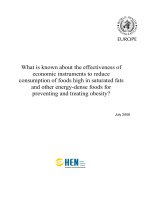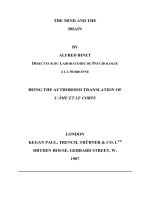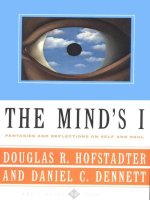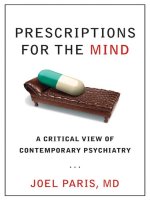- Trang chủ >>
- Khoa Học Tự Nhiên >>
- Vật lý
passionate engines what emotions reveal about the mind and artificial intelligence dec 2001
Bạn đang xem bản rút gọn của tài liệu. Xem và tải ngay bản đầy đủ của tài liệu tại đây (15.97 MB, 273 trang )
Passionate
Engines
This page intentionally left blank
Passionate Engines
What
Emotions Reveal
About
Mind
and
Artificial Intelligence
Craig DeLancey
OXFORD
UNIVERSITY
PRESS
2002
OXFORD
UNIVERSITY
PRESS
Oxford
New
York
Athens Auckland Bangkok
Bogota
Buenos Aires Cape Town
Chennai
Dar es
Salaam Delhi Florence Hong Kong Istanbul Karachi
Kolkata
Kuala Lumpur Madrid Melbourne Mexico City Mumbai Nairobi
Paris
Sao
Paulo Shanghai Singapore Taipei Tokyo Toronto Warsaw
and
associated companies
in
Berlin Ibadan
Copyright
©
2002
by
Craig DeLancey
Published
by
Oxford University Press, Inc.
198
Madison Avenue,
New
York,
New
York 10016
Oxford
is a
registered trademark
of
Oxford
University Press
All
rights reserved.
No
part
of
this publication
may be
reproduced,
stored
in a
retrieval system,
or
transmitted,
in any
form
or by any
means,
electronic, mechanical, photocopying, recording,
or
otherwise,
without
the
prior
permission
of
Oxford University Press.
Library
of
Congress Cataloging-in-Publication Data
DeLancey,
Craig, 1965-
Passionate engines
:
what emotions reveal about mind
and
artificial intelligence
/
Craig
DeLancey.
p. cm.
Includes bibliographical references.
ISBN
0-19-514271-3
ISBNO-19-5I7366-X(pbk.)
1.
Philosophy
of
mind.
2.
Emotions (Philosophy)
3.
Artificial
intelligence.
I.
Title.
BD418.3.D45
2002
128'.37—dc21 00-066903
Printed
as an
Oxford University
Press
paperback,
2004
987654321
Printed
in the
United States
of
America
on
acid-free paper
For
Lorena
This page intentionally left blank
Preface
Goals
of the
Book
T
his
book
is a
survey
of
what
basic
emotions reveal about some
central
problems
of the
philosophy
of
mind. Given their relative importance
to
our
mental lives, emotions remain
the
mental phenomena most neglected
by
contemporary philosophy
of
mind
and the
sciences
of
mind. This
is not
to
deny that important work
has
been done
in our
time
in the
philosophy
and
science
of
emotions; rather,
it is to
note that
for
the
traditional interests
of
philosophers
of
mind, cognitive scientists,
artificial
intelligence
re-
searchers,
and
many others, emotions remain peripheral, sometimes even
a
seemingly
irrelevant
issue.
This
is a
glaring
exception
not
only because
emotions play such important roles,
but
also because
the
last several
de-
cades have seen
a
tremendous growth
in our
scientific
understanding
of
emotions.
In
this
book,
I
will show that
a
proper accounting
of
some
of
the
emotions
is
essential
to
many
of
those aspects
of the
philosophy
and
sci-
ences
of
mind
heretofore
considered distinct
from
them. Given
our in-
creased knowledge about emotions,
the
time
is now
ripe
for an
overview
of
how
they
reflect
on
some
of
the
theoretical issues
of
these disciplines. This
book
provides
such
a
survey
for five
central
issues:
(1)
The
Affect
Program Theory. Emotions
are
mental phenomena
of
intrinsic interest;
the
affect
program theory
is a
compelling
and
powerful
theory that explains what
some
of the
emotions are.
I
introduce
the
theory,
defend
it
against rival views,
and
outline
some
of
what
it can
tell
us
about
the
mind.
(2)
Intentionality.
The
basic emotions
are
representational states.
I de-
scribe
the
structure
of
the
intentionality
of
the
basic
emotions,
and
explore some implications
of
this
enriched view.
(3)
Rationality. Philosophers have long thought that emotions
may
play
an
important role
in
rational action;
I
describe some aspects
of
this relationship,
and
apply
my findings to a
core problem con-
cerning practical reasoning.
viii
Preface
(4)
Phenomenal consciousness. Some
features
of
phenomenal expe-
rience
are
particularly pressing when
we
consider
the
basic emo-
tions. Discovering
the
structure
of
the
relation between phenome-
nal
experience
and
affects
will
be
used
as a way to
explore
the
more
general
issue
of the
relation between those experiences
and the
body
states
of
the
organism.
(5)
Artificial
intelligence
(hereafter
"AI").
Work
in AI
offers
us an op-
portunity
to
test hypotheses,
and
also helps
us to
question
our own
presuppositions.
Our
best understanding
of
the
affects
reveals
im-
portant
principles
useful
to the
theoretical underpinnings
of our
attempts
to
engineer intelligence.
These last
four
issues
are not
necessarily related
to
each other except
in as
much
as
they
are all
core concerns
of
the
philosophy
of
mind.
I
chose these
because they
are
topics
in the
philosophy
of
mind about which,
I
believe,
our
understanding
of
the
basic emotions
has
profound lessons
to
offer.
My
approach
to
these
issues
is
united
under
three
themes.
First,
the
the-
ory
that
I
argue
for in the first
section
of the
book—the
affect
program the-
ory—is
used throughout
the
text.
To
attempt
an
overview
of all the
import
of
all the
things that
we
call "emotions" would
be
folly.
Focusing
on a
small
number
of
emotions
and a
single theory
of
their nature will allow
me to
reveal
some
of the
important implications
of
these
affects,
instead
of
con-
stantly
obscuring
any
such lessons under
difficult
issues
of
taxonomy.
Second,
I
argue that
the
affect
program theory
is
consistent with,
and
points
us
toward,
a
view
of
mind quite contrary
to
much contemporary
theory
of
mind.
I
call this
the
hierarchical view
of
mind.
This
is a
modular
view
of
mind
in
which certain capabilities
are
seen
as
more
fundamental
to
autonomy,
and are
likely
to be
required
by
other (hence, dependent) capa-
bilities.
In
particular, many
of our
affective
capabilities,
and
also
our
capa-
bilities
underlying motor control
and its
integration
with
perception (ca-
pabilities that
are
likely highly integrated
with
affect),
are
more
fundamental
than,
and can and
often
do
operate independently
of, the
kinds
of
capabilities that
are
typically taken
to
constitute "high cognition";
and in
turn many cognitive abilities make
use of, and may
require, these
other
subcognitive abilities. Instead
of a
top-down, highly cognitive view
of
mind,
in
which language
is
seen
as the
fundamental mental capability
that
enables autonomy
and
intelligence,
a
proper appreciation
for
the
role
of
affects
in our
lives reveals that
we
must start
with
a
bottom-up, embodied
view
of
mind
in
which motor control
and its
integration with perception,
along
with
our
affective
capabilities,
are the
fundamental
features
of
auton-
omy,
upon which intelligence must
be
built. Equivalently,
I
argue that
ex-
plaining
a
general conception
of
autonomy,
and not
cognition, should
be
the
primary goal
of the
philosophy
of
mind.
This
is a
theme that arises
throughout
the
book.
Third
is a
theme that will come
to the
fore
several times: Giving
the
relevant emotions their
due
reveals
a
need
to
reevaluate
the
richness
of a
Preface
ix
naturalist view
of
mind.
In
contemporary philosophy
of
mind, almost
everyone pledges allegiance
to
naturalism;
yet we are in the
ironic position
that there
is a
widespread reaction
to
naturalism
in
contemporary analytic
philosophy,
often
apparently motivated
by the
belief that naturalism
is an
impoverished approach
to
mind. This
is
ironic because
the
offered
alter-
natives
are
usually
stupefyingly
simplistic,
the
most common being that
all
of
mind
and
action
can be
explained
by
generic
concepts
of
belief
and
desire. Since
my
concern
in
this book
is
with basic emotions
and
other
motivating
states,
I
will
on
several occasions discuss
the
inappropriateness
of
the
philosopher's notion
of
desire;
it is
hard
to
overestimate
the
harm
that this notion
has
done
to
moral psychology, action theory,
and
other
aspects
of the
philosophy
of
mind.
In
contrast,
far
from
being
a
source
of
simplistic
descriptions likely
to
label
as
illusions
whole swathes
of our
mental lives
as we
reduce down
to
some simple physics,
the
sciences
of
mind usually reveal surprising complexity (for example, there
are
many
kinds
of
motivational states,
but no
generic
one
corresponding
to the
phil-
osophical notion
of
desire)
and are
causes even
for
the
introduction
of
new
entities
and
thus
an
expansion
of the
relevant ontology.
In
this
book,
I do
not
review
the
literature
and
issues
in the
philosophy
of
science concerning
naturalism,
but
rather
I
show
by
example that
a
kind
of
naturalism
is
both
richer
than
it has
been portrayed
and far
richer than
the
alternatives.
Through
the
study
of the
basic emotions certain features
of a
mature view
of
mind
can be
clarified,
and a
rejection
of a
simplistic
portrayal
of
natural-
ism is one
such
feature.
By
saying that
an
account
of
some emotions
is
essential
to the
philosophy
and
science
of
mind,
I
mean
at
least that
we
cannot expect
a
theory
of
mind
to be
sufficient
unless
we
have taken
into
account
whether
it is
consistent
with what
we
know about these emotions. Establishing this point
is
easily
done when
we
recognize that many theories
of
mind, which seem quite
plausible when emotions
are
ignored, become quite implausible when
emotions
are
taken into account. This
is the
case
not
just because these
theories
fail
to
predict
or
explain emotions.
After
all, since many research-
ers
in the
philosophy
and
science
of
mind
see
emotions
as
something
to be
tacked
onto
a
theory
of
mind
after
cognition
is
explained,
the
failure
to
predict
or
explain emotions
is
hardly surprising. Also, there
is
broad agree-
ment that
if
we
want
to
model real biological minds,
we
will
need
to
model
affects,
since they
are
biological events which,
in us, are
nearly omnipres-
ent.
But
even
the
kinds
of
things
that
a
philosopher
or
scientist might want
to
study independently
of
emotions
are
often
so
highly integrated with
them
that treating these emotions
as a
kind
of
sideshow
can
only
result
in
inadequate theory. Many
of
these
inadequate theories
are
considered viable
in
contemporary philosophy
and
science
of
mind,
and
their continued pur-
suit
results
in
wasted
effort.
Although these negative conclusions
are
crucial,
my
task
is not
solely
to
attack
inadequate approaches. Throughout,
my
arguments
for the
general
and
widely applicable
affect
program theory will prove
useful
in
showing
x
Preface
how our
understanding
of
emotions
can
offer
new
approaches
to
under-
standing minds.
I
argue
for
positive theories
of the
nature
of
emotional
intentionality
and
rationality,
and of the
substrates
of
phenomenal con-
sciousness,
that
are
consistent
with
the
affect
program theory,
and I
offer
some
speculations about
how our
understanding
of
emotions might help
AI.
At
this moment
in the
philosophy
and
sciences
of
mind, because
of
the
relative neglect that emotions have
suffered
for
some time, they
are a
prom-
ising source
for new
understanding
of
the
mind.
The
Audience
Although
this
is a
work
in the
philosophy
of
mind—tackling issues tradi-
tionally
in the
domain
of
philosophers
and
using methods
and
terminology
characteristic
of
philosophy—I wrote
this
book
with
the
hope that
it
could
reach across disciplines
and
speak
to
anyone interested
in
mind
and
emo-
tions.
For
that
reason,
I
have provided throughout
the
book
explanations
of
some technical,
and
mostly philosophical, terms
and
theories; when these
explanations were quite independent
of the
argument,
I put
them either
into
footnotes
or
into boxes that
run
parallel
to the
text.
The
boxes
aim to
do
two
things:
first, to
explain some technical terms
and
theories
in an
unobtrusive way; second,
to
attempt
to
make clear
why
these issues
are
important.
I
also
found
that when
I
referred
to a
concept that
I
would later
discuss
at
length,
it was
most convenient
to
delay
defining
the
relevant
terms; readers
are
therefore
urged
to
check
the
index
for
reference
to an
unfamiliar
notion
and
then skip ahead
to find
explanations. Over
the
last
few
years
I
have
had the
good
fortune
to
work
and
study with psychologists,
psychiatrists, neural scientists, computer scientists, electrical engineers,
anthropologists,
physicists,
and
philosophers. This
has
taught
me
that
our
terminologies
often
sound deceptively similar when they
are
significantly
different,
and
that
it is
often
difficult
for
workers
in one
discipline
to
under-
stand
why the
concerns
of
those
in
another
are
of
any
relevance.
The
study
of
mind
is an
interdisciplinary undertaking,
and I try to
participate
in
this
spirit
by
exploring issues that, although largely philosophical, span several
domains
of
inquiry.
But
doing
this
requires that
we be
very explicit about
what
our
terms mean, what
our
concerns
and
goals
are, what
our
underly-
ing
method
is or
should
be, and why the
issue should matter
to
someone
not
directly concerned with
the
debate
at
hand.
I
have also tried
to
approach each issue discussed
in the
book
on its own
ground;
that
is, in the
terms
and
formulation
of
the
theory
in
question. This
is
neither
an
endorsement
of
theoretical ecumenicalism
nor an
attempt
to
get
around
the
disparate uses
of
terms
in
different
disciplines,
but
rather
is
an
attempt
to
achieve results that will stick.
For
example,
our
best
scientific
understanding
of
emotions
effectively
demolishes
the
view that
all
emo-
tions
are
just
judgments
or
some other kind
of
prepositional attitude. Some
views
of
mind
and
emotion
are
quite immune
to
these scientific
findings,
Preface
xi
however, because they place
the
stuff
of
mind
outside
the
reach
of
these
results.
By
confronting
one
popular such kind
of
theory
in its own
terms,
I
show that
it is
untenable even
on its own
presuppositions. Similarly,
artifi-
cial
intelligence
is the
attempt
to
create systems that exhibit intelligent
or
autonomous behavior. Even
if
some approaches turn
out to be
biologically
implausible,
if
they result
in
practical solutions
to
real-world problems,
they will
be
gladly
and
rightly embraced. Thus,
indifference
to
emotion
will
not
likely
be
accepted
as a
problem
if it
means nothing more than
a
failure
of
biological modeling.
But by
showing that understanding
affects
has
more
to
offer
than just augmenting
the
realism
of
models,
I
will
show
that
artificial
intelligence
at the
engineering
end
of
the
spectrum
has
some-
thing
to
learn also.
A
corollary
of
this approach
is
that
the
overarching
themes that
unite
my
topics
are not the
sole purpose
of the
claims made
here.
In
those arguments
not
solely directed
at the
defense
of the
affect
program
theory
or of the
hierarchical view
of
mind,
my
claims about both
the
emotions concerned
and
alternative theories should stand
or
fall
on
their
own
merits.
Thus,
for
those wholly hostile
to the
affect
program theory
or
to the
view
of
mind
I
advocate, much
of the
material
in
this
book
should
still
be of
interest.
The
Form
of the
Book
The
book
can be
divided into
two
parts. Part
1
introduces
the
affect
program
theory
and
defends
it
against some cognitivist
and
irrealist alternatives;
part
2
surveys some core concerns
in the
philosophy
of
mind,
and
applies
to
them
the
insights that
our
best understanding
of
the
basic emotions,
and
other
affects,
provides.
Chapter
1
introduces
and
explains
the
affect
program theory, showing
why
it is
compelling, given both
the
empirical evidence consistent with
it
and
its
explanatory power. There
is
still
no
widespread agreement about
the
taxonomy
of
emotions,
and so the
statement
of
this theory
is
couched
in
a
limited discussion
of
taxonomy
to
assure
the
reader that
the
affect
pro-
gram
theory
is
both
a
worthwhile
way to
understand some emotions
and is
actually
a
theory
of
the
emotions that
we
refer
to in our
normal discourse.
Although
a
strong
cognitive view
of
emotions
still
seems
to be
widely
held,
it has
drawn
a
number
of
powerful
criticisms
in
recent years. How-
ever,
these criticisms have
not
touched upon
two
factors.
First,
little
atten-
tion
has
been paid
by
philosophers
to the
vast body
of
neuroscientific
and
psychological
evidence that
is
contrary
to
cognitivism about emotions.
In
chapter
2,1
undertake this task. This
will
also
offer
an
opportunity
to
review
some
of
the
empirical evidence
for
the
hierarchical view
of
mind that
is one
of
the
primary themes
of the
book. Second,
the
implications
of the
failure
of
cognitivism about emotion
for the
theory
of
mind have
not yet
been
explored.
In
chapter
3,1
consider
one
of
the
most influential views
of
mind
today,
the
interpretationist view advocated
by
Donald
Davidson, Daniel
xii
Preface
Dennett,
and
others,
and
show
how it
requires
a
cognitivist view
of
emotion
and
fails
because
of its
inability
to
properly explain emotional actions.
Interpretationism
is an
irrealist theory
of
mind,
and so it has
certain
im-
munities
to
some kinds
of
appeal
to
scientific
evidence.
My
task will
be to
both
criticize
the
view
on its own
ground (using conceptual analysis cou-
pled
with
some platitudes about action
and
basic emotions),
and to
show
how
basic emotions suggest that
a
naturalist theory
of
mind
is a
more satis-
factory
approach than these alternatives. Social constructionism
is a
view
of
mind consistent with interpretationism
and
other
forms
of
irrealism
about
emotions,
but
immune
to the
problems
I
raise
in
chapter
3;
thus,
in
chapter
4,1
discuss
and
criticize social constructionism about basic emo-
tions
on
different
conceptual
and
empirical grounds.
Having
introduced
the
affect
program theory
and
defended
it
againstboth
cognitivism
and
some
forms
of
irrealism about
the
relevant emotions,
I
then
survey
the
import
of
this view
for
some
core
issues
in the
philosophy
of
mind.
Chapters
5 and 6 are
concerned with intentionality. Chapter
5 de-
scribes
the
heterogenous structure
of the
intentionality
of the
basic emo-
tions—a
view consistent with
the
hierarchical view
of
mind.
I
argue that
explaining
the
intentionality
of
the
basic emotions
is
best done
by
reference
to
their role
in
action. This alternative view
is a
powerful
way to
explain
some
perplexing problems.
In
chapter
6,1
clarify
these
insights
and
pursue
an
application
of
them
by
considering
our
common practice
of
emoting
for
imaginary
events, such
as
those portrayed
in fictions.
This
offers
a
ready
counterexample
to a
cognitivist view
of
emotion
and
also provides
an ex-
ample
of one of the key
features
of
intentionality:
the
possible inexistence
of
the
intentional
object.
The
heterogenous model
of
intentionality devel-
oped
in
chapter
5
will
allow
me to
give
a
proper account
of our
ability
to
emote
for fictions, and
will
help
clarify
the
relationship
between emotional
intentionality, propositional intentionality,
and
some instances
of
inten-
tional states "directed
at"
nonexistent things.
Chapters
7 and 8
explore
the
senses
in
which
the
basic emotions
can be
rational
and
what role they
may
play
in
more general notions
of
rationality.
Chapter
7
extends
the
hierarchical model
of
mind
to
explaining
the
ration-
ality
of the
basic emotions
in a way
consonant with
the
discussion
of the
form
of the
intentionality
of the
basic emotions. Chapter
8
applies this
approach
to a
core problem
in the
philosophy
of
practical action:
the
ques-
tion
of
internalism.
Chapters
9 and 10 are
concerned with
the
question
of
consciousness.
Basic
emotions have been largely neglected
in
this
nowburgeoning debate.
Chapter
9
addresses some puzzles that
the
phenomenal experiences
of
some
affects
raise
for
the
current debate. Chapter
10
argues that these puz-
zles reveal that
an
appropriate theory
of
consciousness should
be
consis-
tent
with
a
claim
for
strong supervenience
of
phenomenal experiences
on
the
functional
role
of
the
relevant
states
as
given
in a
systems-based teleo-
functional
theory.
I
provide
the
outlines
of one
such theory,
and
show
how
it
solves
the
puzzles presented
in
chapter
9.
This
theory also
is
consistent
Preface
xiii
with
the
bottom-up aspect
of
the
hierarchical view
of
mind,
and as
such
the
theory
provides
a way to
clarify
the
notion
of
autonomy.
Chapters
11 and 12
address
the
theoretical underpinnings
of
AI.
Many
of
the
general lessons
of the
history
of AI are
consistent with
a
view
of
mind
that gives
the
basic emotions
their
proper place
in the
theory
of
mind; most
important,
the
failures
and
limitations
of
AI
spotlight some
of the
miscon-
ceptions
that
are
common
to the
theory
of
mind
and
that
also
typify
a
view
in
which
the
role
of
affects
is
ignored. Thus, although
AI is not a
topic
so
much
as a field of
study
and a
collection
of
techniques,
I
discuss
it
here
for
the
important empirically based view
it
offers,
one
that augments
the
neu-
roscience
to
which
I
refer
throughout
the
book. Chapter
11
returns
to the
issues
of
intentionality
and
rational action,
but
this
time
in
terms
of the
computational theory
of
mind.
I
show that some
affects
and
their influences
upon cognition stand
as a
counterexample
to
certain
forms
of
computa-
tional functionalism. Chapter
12 is
something
of an
indulgence:
I
draw
some
distinctions concerning
the
place
of
affects
in AI and
summarize
some
practical applications
of our
knowledge
of
affects.
In the
conclusion,
I
review some
of the
theoretical implications
of
this
knowledge
and
summarize
the
view that
it
suggests:
the
mind
as
passionate
engine.
All
academic work
is
open source.
It is my
hope
to
gather comments,
corrections, references
to new
(and
overlooked)
relevant
scientificfindings,
and
suggested additions
from
readers like you.
I
will
use
these
to
revise
and
expand
future
editions
of
Passionate Engines. Please bring your insights
to
www.passionateengines.org.
This page intentionally left blank
Acknowledgments
I
am
indebted
to a
number
of
colleagues
for
help
and
support. Foremost
are
Nino
Cocchiarella,
who has
been
a
teacher, mentor,
and
friend,
and
Adam
Kovach,
who has
read
and
offered
useful
comments upon several chapters
of
this book,
and has
long otherwise been
to me a
gadfly
and
example.
Joe
Steinmetz introduced
me to
neuropsychology,
which
was the
beginning
of
my
interest
in
emotions,
and for
this
I
shall always
be
grateful;
Joe
also
offered
helpful points
of
clarification
for my
interpretations
(for
which
he
cannot
be
held
responsible!)
of
neuroscientific
results
in
chapters
1
through
5.
Jonathan Mills
and the
other researchers
at
Indiana University's Adap-
tive Systems
Lab
have provided instruction, infectious enthusiasm,
and
much encouragement
for my
efforts
to
break into
AI;
Jonathan patiently
tried
to
turn
me
into
a
"philosophical engineer,"
as he so
aptly called
it, and
though
I
have made only small steps
in
that direction,
I owe him
much
for
showing
me the
path.
I
also
owe
thanks
to
Paul
Griffiths,
Lis
Nielson,
and
Jaak
Panksepp
for
valuable advice.
Two
anonymous reviewers
for
Oxford
University Press
offered
gracious guidance. Thanks also
to the
other mem-
bers
of the
Analytic Philosophy Project
and of
F.R.E.R.
Most important,
Lorena
Ferrero DeLancey
and
Nancy Calabresi have
for
many years
pa-
tiently supported
all of my
undertakings, including
the
long road
to the
research underlying this book.
Some
of the
work
in
this
book
was
supported
by a
Nelson Fellowship
from
the
department
of
philosophy
at
Indiana University,
and by a
summer
research grant
and a
summer research fellowship
from
the
Program
of
Cog-
nitive Science
at
Indiana University.
I am
grateful
to the
department
and
program
for
their support.
My
work
on
artificial
intelligence
has
been sup-
ported
by a
National Science Foundation graduate research traineeship.
Chapter
3
appeared
in a
slightly
different
version
in
Philosophical
Psy-
chology
(11,
no. 4
[1998]),
and
some
of
chapter
10
appeared
in
Philosophi-
cal
Psychology, (10,
no. 2
[1997]).
I
thank
Carfax
Publishing Limited (P.O.
Box
25,
Abingdon, Oxfordshire, OX14 SUE, United Kingdom)
for
permis-
sion
to use the
pieces here. Some
of
chapter
9
appeared
in
Journal
of
Con-
sciousness
Studies
(3,
nos.
5—6
[1996]);
thanks
to the
journal
for
letting
me
xvi
Acknowledgments
reprint some
of
that
article. Some
of
chapter
11
appeared
in
1997
in Two
Sciences
of
Mind: Readings
in
Cognitive Science
and
Consciousness,
ed-
ited
by
Sean
6'Nuallai'n,
Paul McKevitt,
and
Eoghan
Mac
Aogin. Thanks
also
to
John Benjamins,
the
publisher,
for
permission
to
draw upon that
work.
Contents
1
Introduction:
The
Affect
Program Theory
of
Emotions
3
2 The
Case Against Cognitivism
31
3
Interpretationism
49
4
Social Constructionism
and the
Contribution
of
Culture
to
Emotion
69
5 The
Intentionality
of the
Basic Emotions
87
6
Emoting
for
Fictions
103
7 The
Rationality
of the
Basic
Emotions
119
8
Internalism
and the
Basic Emotions
135
9
Four Puzzles
for
Consciousness
155
10 A
Systems-Based Teleofunctional
Theory
of
Consciousness
169
11 The
Computational Theory
of
Mind
187
12
Affective
Engineering
203
13
Conclusion: Passionate Engines
215
Notes
225
Bibliography
235
Index
249
This page intentionally left blank
Passionate
Engines
This page intentionally left blank
1
Introduction
The
Affect Program Theory
of
Emotions
T
here probably
is no
scientifically appropriate class
of
things
referred
to
by
our
term emotion. Such disparate
phenomena—fear,
guilt, shame,
melancholy,
and so
on—are
grouped under
this
term that
it is
dubious that
they share anything
but a
family
resemblance.
But
particular emotions
are
another matter altogether. There
is
good reason
to
believe that
different
sciences
can
make quite compelling sense
of a
more
fine-grained
differen-
tiation
of
affects.
My
task
in
this
book
is to
reveal some
of
the
important
and
neglected lessons
of
some
of
the
emotions
for the
philosophy
and
sciences
of
mind,
and
this
task
can be
accomplished with just
a
working characteri-
zation
of a few of
these. More important, there
is a
compelling theory
of
some
emotions
that
has
far-reaching implications
for the
philosophy
and
sciences
of
mind. This
is the
affect
program theory. Using
a
version
of
this
theory
as a
guide
to
what
phenomena
we
will
be
concerned
with
and to the
nature
of
these phenomena will allow
us to
avoid fundamental confusions
and
to
provide richer results.
The
affect
program theory
is the
view that some emotions
are
pancultural
syndromes
enabled
by
inherited biological capabilities.
By
calling them
"syndromes,"
we
mean
to
point
out
that
they
are
coordinated collections
of
complex
biological responses that occur together. These emotions will
be
characterized
by
several
features,
including
at
least physiological
re-
sponses, such
as
autonomic body responses,
and
stereotypical associated
behaviors, such
as
facial
expressions
but
also relational behaviors.
I
will
call
the
emotions that
are
taken
to
fall
under
the
affect
program theory
"basic emotions," just
so
that
we
have some
way to
refer
to
them.
1
This
is a
very
general formulation
of the
affect
program theory; however,
with
some
small elaboration
in
this
chapter,
it
will
be
sufficient
to
allow
me to
draw
some very important lessons about
the
nature
of
mind.
This theory
is
meant
to
describe only some
of the
things that
we
might
call
an
emotion.
In
part
as a
result
of
this, there
is
plenty
of
room
for
contro-
versy regarding whether
this
is a
proper theory
of
emotion.
For
example,
some theorists have argued that conscious experience
is a
necessary ele-
ment
of an
emotion
(Clore,
1994), whereas this
is not the
case
on the
affect
3
4
Passionate
Engines
program
theory. Thus,
one
might argue that
the
affect
program theory does
not
properly describe
the
emotions
as the
normal speaker means
to
refer
to
them.
The
affect
program theory
is an
empirical theory;
it is not
beholden
to
fit
exactly
our
folk
use of
affect
terms,
or our
folk
theory about
affects
(see
Griffiths,
1997]. Ultimately,
the
defense
of the
affect
program theory must
rest
on how
well
it (1)
usefully
defines
and
distinguishes
the
various
affects,
and (2)
explains
and
predicts
the
relevant phenomena. Defending
the
the-
ory's utility
to
explain
and
predict
the
relevant phenomena
is
done
throughout
this
book,
by way of
applying
the
theory
and
showing
how it
can
offer
powerful
new
ways
to
think about some
of
the
problems
of
mind.
Defending
the
theory
as a
useful
way to
categorize
the
affects
is
something
I
will
do in
this
chapter
and the
next.
My
approach will
be to
examine some
of
the
features
of
affects
that
other scholars have singled
out as
necessary
or
sufficient
or
perhaps even just important
to
emotions
and
other
affects.
Our
best
scientific
understanding
of
these features reveals that they
are
either
consistent with
the
affect
program theory,
or are not
appropriate ways
to
ground
a
theory
of
affect.
This
will
also allow
me to
review
the
scientific
evidence
and
theoretical reasons that
lay the
foundations
for
a
view
of
mind
that
is
quite
different
from
most
of
those
that characterize contemporary
philosophy
of
mind.
Although scientists have tended
to be
more
careful,
and
usually provide
sufficient
operational notions
of the
emotions
and
other
affective
states
they study,
until
recently
(e.g.,
Griffiths,
1997) there
has
been scandalously
little concern among philosophers
(even
philosophers
of
emotion)
for
clar-
ifying
their taxonomic presuppositions. This oversight
is not
innocuous,
since
it
fosters
both
an
extremely error-prone armchair theorizing, some-
times even armchair neuropsychology,
and
also vagueness
and
confusions
that
can
result
in
question-begging
and
pernicious ambiguities.
Most
philosophy
of
emotion
has
proceeded
in one of
three ways.
In re-
cent years
it has
been most common
for
emotions
to be
investigated through
the use of
emotion terms. This
is an
approach which
is
sometimes taken
to
an
extreme
by
those
who
endorse
the
position that
the
conceptual analysis
of
ordinary language
is all
that
is
needed
to
understand emotions,
or by the
social constructionists,
who see
culture—of
which
they take language
to be
the
most important
and
revealing element—as
the
creator
of
emotions. Paul
Griffiths
(1997,
21ff.)
has
effectively
criticized
the
former,
pointing
out
that
ordinary language analysis approach
to
emotion
studies
has
been based
upon philosophical presuppositions that
are now
largely debunked.
I
will
criticize
a
strong social constructionist approach
in
chapter
4. A
second
method
for
philosophizing about emotions, more revealed
in the
lack
of an
explicit
method,
is to
take emotions
as
primitives open
to
reliable intro-
spection;
not
surprisingly,
this
approach usually yields
the
view that emo-
tions
are
fundamentally cognitive.
But
taking emotions
as
having proper-
ties
that
are
somehow obvious inevitably leads
to
begging
all the
important
questions; emotions
are
introspected
to
have just
the
qualities
needed
to
support whatever theory
is at
hand.
I
shall review some cases that show
Introduction
5
how
psychologists
and
neural
scientists
have discovered some very sur-
prising things about
our
everyday emotions, things which would certainly
fail
to be
noticed
by
introspection. Introspection also results
in
subjective
characterizations that
are
hard
or
impossible
to pin
down. Without some,
even
if
rough, prior
and
objective (that
is,
third-person, open
to
observa-
tion)
characterization
of
the
things
we are
discussing, much
of
this work
on
emotions
can be
useless.
A
third approach
is to
simply
define
emotions
and
work with these definitions;
this
also
has
traditionally yielded cognitive
approaches.
Defining
emotions
up
front
in
some cognitive
form
would
be,
of
course, quite acceptable
if
this were
not
usually
followed
by
sweeping
generalizations that reach beyond
the
scope
of the
class
of
phenomena
picked
out by the
definition.
As it
stands,
all too
often
we find
that
a
theorist
starts
with
a
definition
of
emotions
that
is
strongly cognitive, then makes
claims about
all
emotions, surreptitiously slipping
in the
assumption that
all of
what others call "emotions"
fall
under
the
definition
of
emotions
as
cognitive.
We
therefore
either need
to be
extremely
careful
not to
errone-
ously
generalize
from
our
definition,
or we
need
to
characterize
(at
least
some)
emotions
in
some sense that
is
guided
by
empirical data
and
allows
us to
formulate
the
core questions about emotions.
I
will take
the
latter
route,
beginning with
a
broad characterization
of
affects
that
is not by
defi-
nition cognitive,
and
then exploring
how we can
build
our way to a
char-
acterization
of
some emotions which will
let us
learn some lessons
from
them.
A
General Notion
of
Affect
It
will
be
useful
to
start with
a
more general characterization
of
affect.
This
will give
us a
chance
to
place
the
relevant emotions
in
relation
to
things
like pleasure
or
mood. There
is
little agreement upon terminology
for
emo-
tions
and
other
affects
in
philosophy, psychology,
or any
other
of the
cog-
nitive sciences.
In
general, terms like emotion
and
affect
are
used synony-
mously.
However,
for
most
of us (at
least
in the
English-speaking world),
paradigm emotions include
fear,
anger, joy, sadness,
and
disgust.
At the
same time, some people consider moods
to be
emotions, including
thus
long-term states that have motivational features very
different
from
those
of,
say, terror.
And
philosophers will talk about
the
importance
of
emotions
to
rationality, seemingly grouping desire
and
other more general conative
states together under
the
term
"
emotion." Given that such
a
disparate group
of
things
can be
labeled
as
emotions,
we
need
to
draw some
distinctions
among
these phenomena. Here
I
shall
try to
avoid confusions
by
using
"affect"
as a
general term,
and
desires, emotions, moods,
and
other states
will
classify
as
types
of
affects.
I
still
need
to
characterize
affect
in
some positive way.
The
working
defi-
nition
I
propose
is:
Affects
are
body states that
are
motivational. (Through-
out
this
book,
I
will take body states
to
include neural states; when
I
want
6
Passionate
Engines
to
draw attention
to the
body independent
of the
central nervous system,
I
will
use the
term "extended body.") This
is not in
itself very enlightening,
since motivation
is not a
little
mysterious.
But the
principal
feature
of
these
motivations
is
that they
are
internal physical states
of an
organism that
cause
it to
perform
an
action
if the
organism
is not
inhibited
by
different
motivations
or
otherwise constrained.
The
relation
of
inhibition
by
other
motivations,
and
also
the
notion
of
constraint, although both intuitively
clear,
are
very hard
to
specify.
Without
a
better account
of
what
it is to
inhibit
or
constrain
a
motivation, this characterization might
be too
vague
if
we
meant
to
explore
the
nature
of
affect
per se. But the
claim that
the
affects
are
types
of
body states
is
sufficient
to
distinguish this notion
of
affect
from
many
of the
competing notions;
in
particular,
it
commits
us to a
realist theory
of
motivations
(in
contrast
to, for
example, ascriptivist
no-
tions
of
desire, such
as I
discuss below
and in
chapter
3).
Furthermore,
this
is a
claim
for
type-identity:
the
body states that motivate
are
instances
of a
recognizable
type. Since
it
will
be
sufficient
to
have
a
working notion
of
just
a
certain
class
of
emotions,
I
will
take
motivation
as a
primitive;
however,
this notion,
as it is
involved with
the
basic emotions that will
be my
concern
here,
will
be
developed
at
more length
in the
coming chapters.
In the
mean-
time,
this
definition
makes
it
clear that
I
link
affects
to
actions.
Affect
Is
Characterized
in a
Functional
Way
Affects
include desires, pleasures, emotions,
and
moods.
We
should note
that these things
are
quite distinct
in the
physiological and,
in
particular,
neural structures that underlie their
function;
we
should
not
expect
to find
a
single brain system
for all
motivation. Furthermore, when they
are
cog-
nitive,
affects
can
include significant input
from
not
only subcortical brain
areas
but
also
from
cortical polymodal
and
supramodal areas.
More
simply
put:
a lot
of
the
brain, including areas seemingly dedicated
to
more abstract
thought,
can
(but need not) become involved
in the
affect.
Thus,
as
occurs
with many biological
functions,
we
should expect some
of the
brain
and
body
substrates
of
affects
to be
distributed.
All
of
these distinctions reveal
that
this
notion
of
affects
is a
functional
characterization that
may not in
any
simple
way
reduce
to a
physical one.
2
We may
indeed
find
that
the
neural underpinnings,
for
example,
of
some particular
affects
can be
quite
clearly
mapped out;
but the
concept
of
affects
in
general
is
unlikely
to
have
such
a
common characterization.
Two
other things should
be
noted about
this
characterization
of
affects.
First, although
I
believe that they
are
necessarily motivational, pains
are
often
understood
in
neuroscience
as
somatosensory phenomena that acti-
vate
a
motivational system.
We
could
use
"pain"
in a
broader sense
to in-
clude
the
activation
of the
motivational systems that neuroscientists take
the
somatosensory aspects
of
pain
to
activate; but, given that nothing here
depends
on it, I
will instead avoid expending
effort
on
what could
be a
contentious issue.
I
will
not
require
that
pains
be
counted
as
affects.
Sec-









